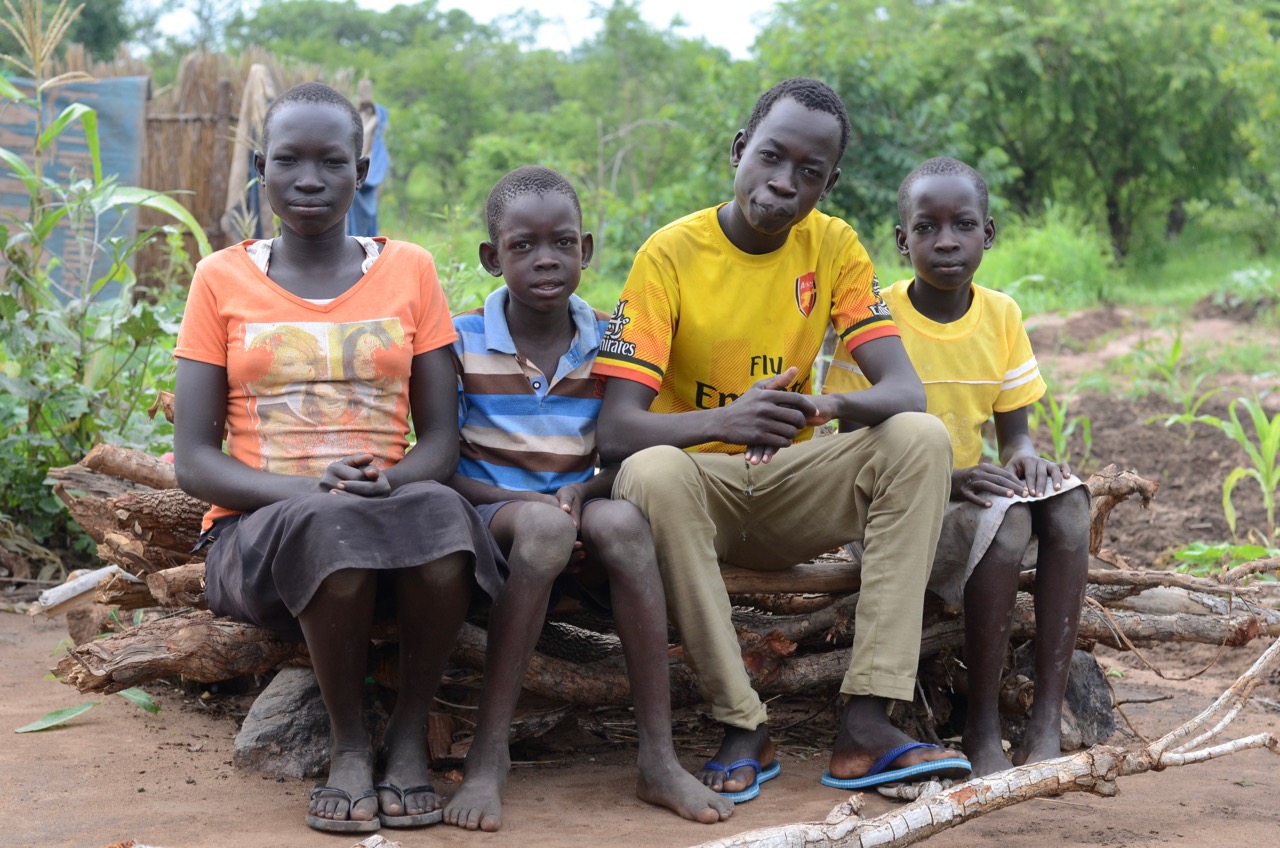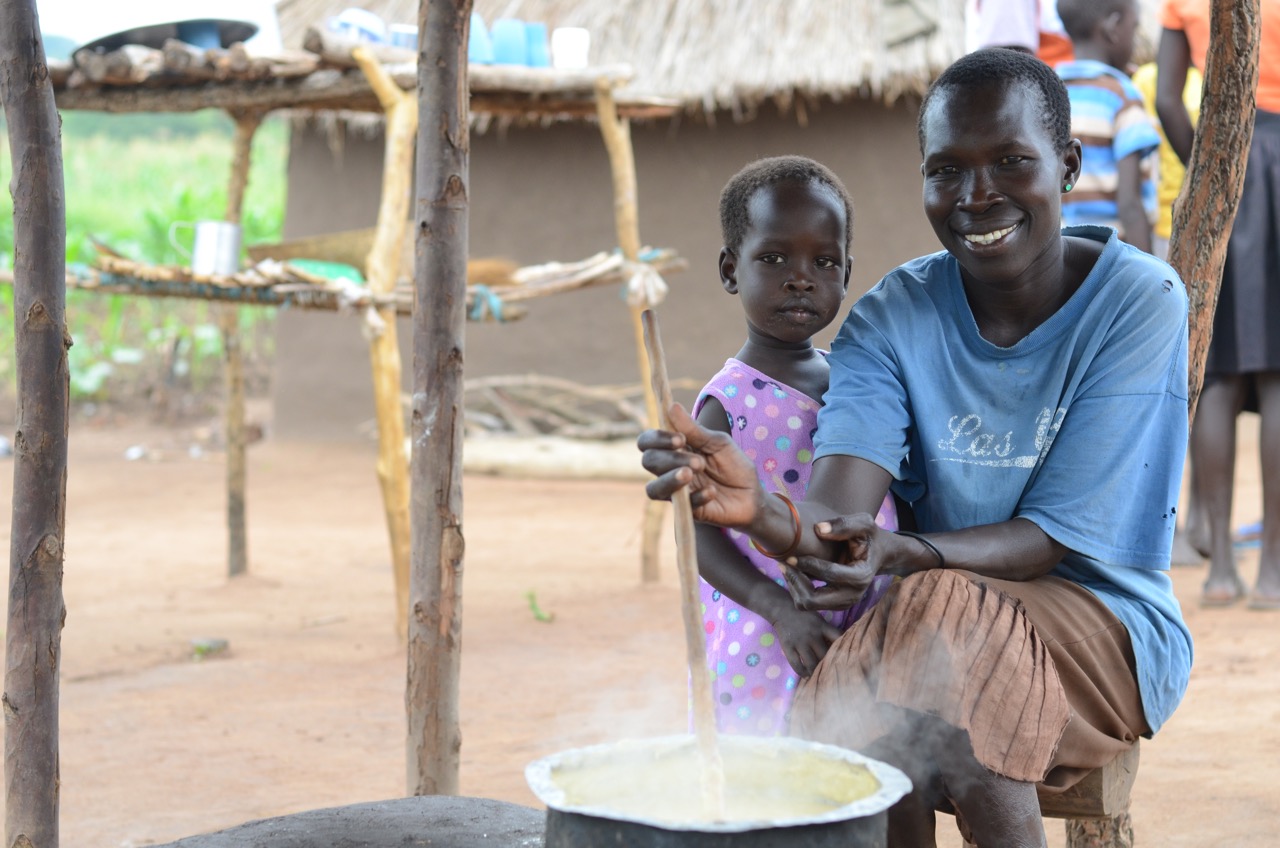Refugees helping refugees: Foster families providing homes to unaccompanied children

In northern Uganda, the concept of family is being redefined. South Sudanese children who have escaped conflict have arrived as refugees, often alone and without the accompaniment of an adult.
Sixteen-year-old Stephen led his three younger siblings as they fled fighting from their village.
“The rebels were fighting very close to our village. We saw our neighbours who were shot and their dead bodies being buried,” Stephen remembers.
The story is repeated over and over across refugee settlements in northern Uganda. Nine-year-old Viola ran with her older brother and sister after discovering her parents’ bodies.
“We were in school and they brought tear gas. We ran. We went home, our parents were dead. We ran,” says Viola. “We ran for three days, even in the night. We only drank water. Even if we found dirty water (along the way), we drank it,” Viola says.
Along the way, children interviewed reported hiding in the bushes and walking away from roads where they feared encounters with armed militia.
“Once we reached the border point, we weren’t scared anymore,” Stephen says.
Providing hot meals, protection services for new arrivals
“We found life in Uganda is so good. They have schools in Uganda. They have places where we can go and play. You don’t hear gunshots,” Stephen says.
After being picked up at border points in northern Uganda, refugees are brought by bus to reception centres where they’re officially registered to receive aid.
World Vision walks alongside unaccompanied minors as soon as they reach refugee reception centres in northern Uganda. Hot meals are provided to all newcomers and child protection services are offered to children.
For children who arrive without an adult, World Vision helps organize a foster family that the children can stay with – fellow South Sudanese refugees who welcome the children into their families, providing a caring and safe place for the children to grow up.
“Even daily life for these children opens them up to a challenge that they are not ready to face. Children who are supposed to be living in a safe world where they can grow up playing, going to school and preparing for a bright future. Instead, they run away from conflict and they are deprived of the loving presence of their family and friends,” says Judy Moore, World Vision’s response director. “We have to take care of these children. They are the future and they need urgent support at this time. Clearly, this crisis is a children’s crisis.”
Finding a family
When Stephen and his three younger siblings arrived in northern Uganda, they found thousands of other refugees at the reception centre. At that time, more than 2,000 refugees a day were flooding across the border, seeking safety.
Stephen remembers arriving in the refugee reception centre with hundreds of others and finally seeing a familiar face.
Mary, a mother of four, was a woman their family knew from a neighbouring village in South Sudan.
“When we met at the transit centre, they came directly to me and asked if they could set up their shelter next to ours, as we know each other from back home,” Mary remembers.
The two families began blending into one. Mary, who has four children of her own, began keeping a careful eye on Stephen and his siblings.
Establishing a home
In Uganda, the government has departed from traditional country responses of setting up camps to deal with refugees. Here, Uganda’s government gives refugee families a plot of land where they can grow a garden, build their own house and have a greater sense of autonomy.
When Mary’s family was given their plot of land, Stephen, his two younger sisters and younger brother followed. Stephen and his friends helped Mary construct three small houses on their plot. Gardens have been planted sprouting pumpkins and corn.
World Vision partners with the World Food Programme to provide refugees with monthly food rations to ensure the refugees have enough to eat.
Every day, Mary cooks, cleans and watches out for the eight children. Because of Mary’s support, the four children could attend a nearby school.
Stephen says the reason they left South Sudan was simply so they could have an education – that’s why the children carried their school books with them while they fled. He’s got his eyes set on becoming a doctor, while his sister Evaline hopes to be a doctor and Stella hopes to “do computer work.”
Ensuring children are protected
World Vision has placed more than 3,500 unaccompanied South Sudanese children who have fled their homeland with refugee foster families.
World Vision provides foster families with essential household items – water containers, blankets, sleeping mats, kitchen sets and soap. Case workers visit homes on a weekly basis to ensure children’s needs are being met and that they are receiving the support they need to flourish in their new home.
Child Protection Officer Evelyn Atim says the foster care program aims to give the unaccompanied and separated children the parenting they need. The foster parents are also briefed and supported in taking care of the children under their care. “Everyday we meet with these children and just by putting a smile on their faces while talking and listening to them and as they play in the child-friendly spaces give us fulfillment,” she says.
“Everyday we meet with these children and just by putting a smile on their faces while talking and listening to them and as they play in the child-friendly spaces give us fulfillment,” she says.



